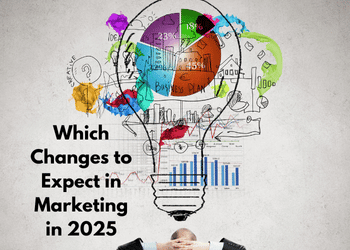Which Changes to Expect in Marketing in 2025
As we look ahead to 2025, marketing is set to undergo transformative changes driven by evolving technology, shifting consumer expectations, and the growing importance of personalization and ethics.
To stay relevant, marketers will need to adapt to these trends, balancing innovation with authenticity. Here are the key changes to expect in marketing in 2025 and how you can prepare to meet the challenges and opportunities of this dynamic landscape.
1. AI-Driven Personalization Will Take Center Stage
In 2025, artificial intelligence (AI) will no longer be a buzzword but a fundamental part of everyday marketing operations. AI-driven personalization will help marketers create highly targeted content and experiences tailored to individual customers. From personalized email campaigns to dynamically updated web pages, brands will use AI to anticipate customer needs and preferences.
Personalization leads to better customer experiences and higher engagement rates, but it will also raise concerns about data privacy. Brands must strike the right balance between personalization and respecting customer privacy to maintain trust.
2. The Rise of Conversational Marketing
By 2025, conversational marketing—using AI chatbots, voice assistants, and messaging apps to engage with customers in real-time—will become a dominant strategy. Consumers increasingly expect instant, two-way communication with brands, and the adoption of natural language processing (NLP) tools will help marketers meet these demands.
Conversational marketing fosters immediacy and personalization, leading to higher customer satisfaction. However, brands will need to ensure that their AI tools are capable of offering accurate, helpful, and empathetic responses to avoid frustrating users.
3. Sustainability and Purpose-Driven Marketing Will Dominate
Consumers are increasingly aligning their buying decisions with their values, and by 2025, sustainability and purpose-driven marketing will be critical for brand success. Customers will expect brands to not only deliver quality products but also demonstrate a genuine commitment to social and environmental issues. This shift will impact every aspect of marketing, from messaging to packaging and product design.
Purpose-driven marketing builds trust and loyalty, but authenticity is key.
4. The Expansion of Immersive Marketing through AR and VR
Augmented reality (AR) and virtual reality (VR) are poised to transform how consumers interact with brands by 2025. As these technologies become more accessible and widely adopted, immersive marketing will play a larger role in the customer journey, allowing brands to create rich, interactive experiences that go beyond traditional advertising.
Immersive experiences create emotional connections with consumers, leading to higher engagement and conversion rates.
5. The Increasing Importance of Zero- and First-Party Data
With the ongoing deprecation of third-party cookies and heightened data privacy regulations, brands will need to rely more on zero-party and first-party data by 2025. Zero-party data refers to information that consumers voluntarily share with brands, such as preferences and feedback, while first-party data is collected directly from user interactions on owned platforms.
As third-party data becomes less accessible, brands will need to build direct relationships with their customers to collect actionable insights.
6. Content Creation Will Be Powered by AI and Automation
While creativity remains at the heart of marketing, AI and automation will streamline content creation and distribution by 2025. AI tools will help marketers generate everything from blog posts and social media captions to video scripts and graphic designs. Automation will also play a crucial role in distributing content across multiple channels and optimizing it for performance in real-time.
AI-driven content creation offers efficiency and personalization, but brands must ensure their content remains creative, human, and emotionally engaging.
7. Video Will Continue to Dominate, Especially Short-Form and Interactive Formats
Video will remain the king of content in 2025, but the focus will increasingly be on short-form and interactive formats. Platforms like TikTok and Instagram Reels have shown the power of short, engaging videos, and this trend will only grow in the coming years. Additionally, interactive video content—where users can make choices or engage with the story—will offer new opportunities for brand engagement.
Short-form and interactive video content keeps users engaged, particularly in a world where attention spans are shrinking.
Marketing in 2025 will be marked by rapid technological advancements, changing consumer expectations, and a greater emphasis on ethics and sustainability. Brands will need to embrace AI and automation to deliver personalized, real-time experiences while staying true to their values and mission. Immersive experiences, conversational marketing, and video will continue to dominate, while data privacy and consumer trust will remain top priorities. By staying ahead of these trends and adapting their strategies accordingly, marketers can thrive in an increasingly competitive digital landscape.




